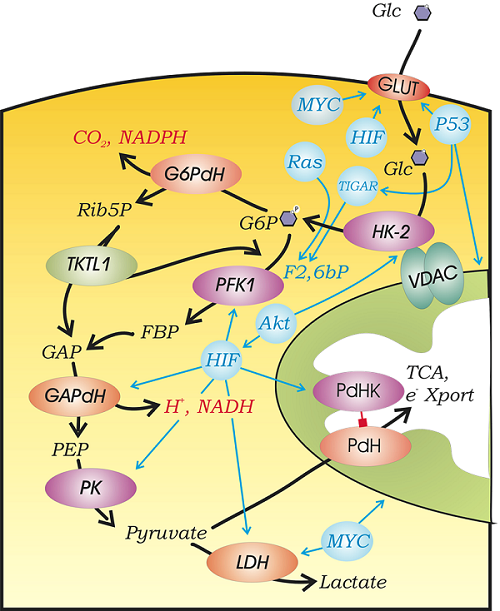Origin of the Warburg Effect
Project Summary:
Eukaryotic cells have two mechanisms of energy (ATP) production: mitochondrial respiration and glycolytic fermentation. Through the groundbreaking work of Louis Pasteur, it was thought that the less efficient fermentation would ensue only if there was insufficient oxygen to support respiration. This was the predominant thought until about 100 years ago, when the Nobel Prize-winning German Physician, Otto Warburg showed that cancer cells ferment glucose at a high rate, even in the presence of adequate oxygen and sufficient mitochondrial function (1). The reasons that cancer cells choose to use the less efficient fermentative pathway over the more efficient respiration have remained a mystery ever since. We believe that we have solved this mystery, and only need to convince others. We have argued that as the efficiencies are so different, this has nothing to do with energy production, where most have been focusing their time. Instead, we argue, that it must have to do with the production of a by-product of fermentation (2). We believe that this byproduct is lactic acid, and have shown through experiments that: 1) acid production is associated with increased cancer invasion (3, 4), 2) that neutralization of acid can prevent invasion (5-10), and 3) that stimulation of acid production can promote invasion (Russell, in prep). Hence, A) fermentation produces acid, B) acid production improves the fitness and survival of cancer cells that do this, and C) cancers that ferment are more likely to succeed and be predominant in those that we detect (11-14).

Mechanisms of the Warburg Effect
References:
- Warburg O, Posener K. Uber den stoffwechsel der carcinomzelle. Bioichem Z 1924;152:309-44.
- Gillies RJ, Robey I, Gatenby RA. Causes and consequences of increased glucose metabolism of cancers. J Nucl Med 2008;49 Suppl 2:24S-42S.
- Estrella V, Chen T, Lloyd M, Wojtkowiak J, Cornnell HH, Ibrahim-Hashim A, et al. Acidity generated by the tumor microenvironment drives local invasion. Cancer research 2013;73(5):1524-35.
- Gatenby RA, Gawlinski ET, Gmitro AF, Kaylor B, Gillies RJ. Acid-mediated tumor invasion: a multidisciplinary study. Cancer research 2006;66(10):5216-23.
- Ibrahim Hashim A, Cornnell HH, Coelho Ribeiro Mde L, Abrahams D, Cunningham J, Lloyd M, et al. Reduction of metastasis using a non-volatile buffer. Clin Exp Metastasis 2011;28(8):841-9.
- Ibrahim-Hashim A, Abrahams D, Enriquez-Navas PM, Luddy K, Gatenby RA, Gillies RJ. Tris-base buffer: a promising new inhibitor for cancer progression and metastasis. Cancer Med 2017.
- Ibrahim-Hashim A, Cornnell HH, Abrahams D, Lloyd M, Bui M, Gillies RJ, et al. Systemic buffers inhibit carcinogenesis in TRAMP mice. J Urol 2012;188(2):624-31.
- Ibrahim-Hashim A, Robertson-Tessi M, Enriquez-Navas PM, Damaghi M, Balagurunathan Y, Wojtkowiak JW, et al. Defining Cancer Subpopulations by Adaptive Strategies Rather Than Molecular Properties Provides Novel Insights into Intratumoral Evolution. Cancer research 2017;77(9):2242-54.
- Ribeiro MD, Silva AS, Bailey KM, Kumar NB, Sellers TA, Gatenby RA, et al. Buffer Therapy for Cancer. Journal of nutrition & food sciences 2012;2:6.
- Robey IF, Baggett BK, Kirkpatrick ND, Roe DJ, Dosescu J, Sloane BF, et al. Bicarbonate increases tumor pH and inhibits spontaneous metastases. Cancer research 2009;69(6):2260-8.
- Gatenby RA, Gillies RJ. Why do cancers have high aerobic glycolysis? Nat Rev Cancer 2004;4(11):891-9.
- Gatenby RA, Gillies RJ. A microenvironmental model of carcinogenesis. Nat Rev Cancer 2008;8(1):56-61.
- Gatenby RA, Gillies RJ, Brown JS. Evolutionary dynamics of cancer prevention. Nat Rev Cancer 2010;10(8):526-7.
- Gillies RJ, Verduzco D, Gatenby RA. Evolutionary dynamics of carcinogenesis and why targeted therapy does not work. Nat Rev Cancer 2012;12(7):487-93.
Project Members
Liping Xu, PhD
Research Scientist
